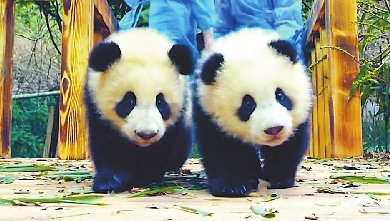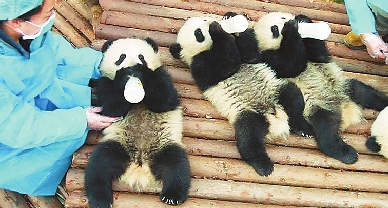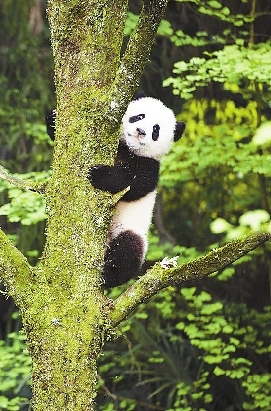



《大熊猫》 Pandas are God’s gift of oversize Teddy bears, big and roly-poly*. Pandas seem to be crying out for our affection*, and for our protection too. And these days, they really need it. Squeezed out of their natural habitat*, pandas as a species are now struggling to find their biological place in the future. Last year, “Born in China,” a Disney co-production, featured a touching chapter about a panda learning to separate from its mother. This is a different story. Narrated by Kristen Bell, the 45-minute film gets down to the harsh* business of survival. It’s built around an attempt*, by animal behavioral scientists to train a panda named Qian Qian, born and raised in captivity, to live in the wild. Much of the movie unfolds* at Chengdu Panda Base, a research facility and idyllic preserve in Sichuan Province that has now fostered the birth of some 200 pandas. But that alone won’t solve the problem; in fact, it is the problem. Though a handful of Chinese pandas still live in the wild, the panda is increasingly a fragile and precious hothouse species — born and raised in captivity, unable to survive on its own. The movie shows you the steep climb they’re now facing. In “Pandas,” there are several human characters, like Hou Rong, the Chinese scientist who is leading the attempt to train Qian Qian, and Ben Kilham, an independent wildlife biologist based in New Hampshire, who is known as a kind of bear whisperer. He has successfully taken brown bears born in captivity and introduced them to the wild. Hou travels to the New England woodlands to study his techniques. We’re rooting for* Qian Qian, whose progress has come to symbolize the future hope for pandas. For a while, she seems to thrive. She learns to climb trees, and to master the activity that pandas do best: sitting around and eating 22 kilos of bamboo a day. But then she’s left on her own, and she doesn’t do so well. In the woods, it seems that Qian Qian must have been lonely; on some level she rejects what it means to live on her own. “Pandas” is less sentimental* than you expect, but you can respect the film’s honesty, and it still leaves you hoping that the next true-life panda adventure delivers more of a feel-good ending — for the audience, but mostly for the pandas.(SD-Agencies) | 
